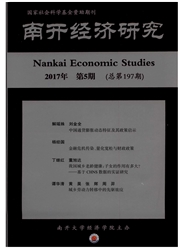

 中文摘要:
中文摘要:
本文主要研究婚姻对居民家庭风险资产选择行为的影响,包括风险资产和股票的参与选择和配置选择,并结合性别、家庭总收入和净财富等因素探究它们的联合影响,数据来自2009年和2012年的中国居民家庭投资状况问卷调查。使用Probit模型和Tobit模型的实证研究结果表明:已婚女性决策者比单身女性决策者更倾向于投资风险资产和股票,更倾向于增加风险资产和股票在总资产中的配置比重,而已婚和单身的男性决策者之间则没有这种差别;与男性决策相比,女性决策者更倾向于投资风险资产;中等收入水平或中等财富水平家庭的决策者在决定是否投资风险资产以及风险资产的配置比重时,可能更易受到婚姻状况的影响。
 英文摘要:
英文摘要:
The objective of this paper is to investigate the effect of marital status on house-hold choice about risky assets, including the participation choice and allocation choice ofrisky assets and stock, and the joint effect of marital status and gender, income as well aswealth, with Chinese households' investment status survey data in the year 2009 and 2012respectively. Using probit model and tobit model, the empirical study results show that inChina, married women have a higher propensity to invest risky assets and stock and to in-crease the shares of risky assets and stock out of total assets than single women, while thereis no such significant difference between married men and single men. The study also sug-gests that compared to men, women have a higher propensity to invest risky assets. In addi-tion, decision-makers in the middle income or middle wealth family are more likely to beinfluenced by marital status when deciding the participation and allocation in risky assets.
 同期刊论文项目
同期刊论文项目
 同项目期刊论文
同项目期刊论文
 期刊信息
期刊信息
